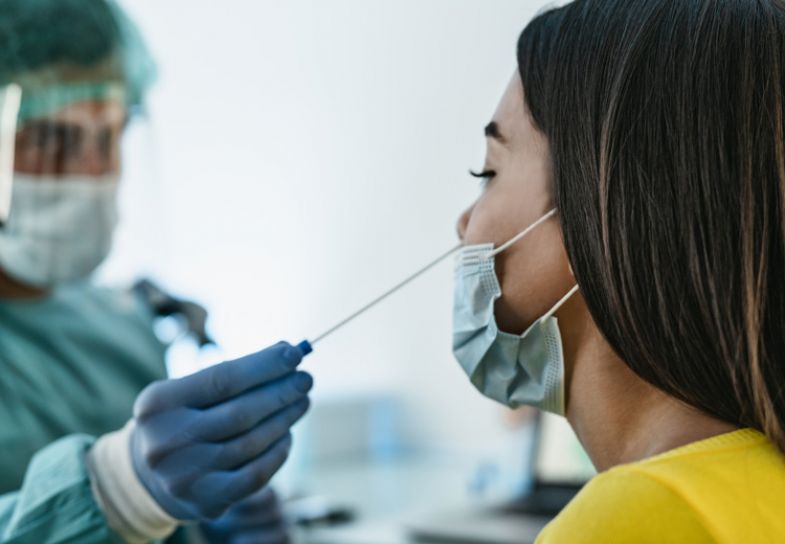
Rapid PCR tests developed by researchers at Alfaisal University are helping solve major accessibility challenges
When the Covid-19 pandemic hit, demand for diagnostic tests skyrocketed. Meeting this demand became a challenge around the world, but in the Arab Peninsula the shortages threw a spotlight on a more fundamental problem: test kits and many other vital medical resources are not manufactured in the region, forcing countries like Saudi Arabia to rely heavily on expensive imports.
Ahmad Aljada, professor of biochemistry and molecular medicine at Alfaisal University, saw an opportunity. “There wasn’t the manufacturing needed in the region, and not only this but the kits themselves are too expensive,” he explains. “I wanted to expose these companies for selling something that costs so little to develop for huge amounts of money.”
Together with his team of researchers at the university’s College of Medicine, Aljada developed a highly-sensitive Covid-19 polymerase chain reaction (PCR) test that could deliver results in just 30 minutes – a game changer for the region and its Covid-19 recovery strategy.
“We started by finding a way to manufacture all the enzymes and raw materials for a diagnostic test from scratch, to avoid buying them from abroad,” Aljada explains. “From there we came up with a formula that enabled us to conduct real-time PCR tests for Covid-19.”
Typically, there are two types of tests to determine whether a patient has contracted the virus: the antigen test – usually known as a “rapid” test for its faster but less reliable results – and the PCR test used by laboratories. Aljada wanted to develop a test that was as accurate as a PCR but which offered fast results for use in the field. To do this, his team had to come up with the necessary “buffers” – the premixed solutions containing the necessary ingredients for carrying out a PCR test in real time.
Conducting the research came with additional challenges given the declared state of emergency. “This was the early days of the pandemic and there was a strict lockdown. Luckily, we got formal permission to travel to work, where we could get the project off the ground,” says Aljada.
The team received a research grant from Saudi Arabia’s major scientific research funder, King Abdulaziz City for Science and Technology, and the project was executed with additional support from college dean Khaled Al-Kattan. Alfaisal University provided the team with extra equipment, including two portable PCR machines.
Unlike traditional PCR tests, which can take two or three hours to complete, Aljada’s can bypass one step of the process called RNA isolation. As such, it “doesn’t require the same level of technical expertise,” he explains.
Patient sample swabs can be added directly to a tube containing the specially formulated solution, which can be run through portable PCR machines for a quick result. “It allows for accurate testing on the road, without the need to send it away to a laboratory,” he adds.
The platform was tested at two major hospitals in Saudi Arabia. What makes Aljada’s solution special is that it is stable at room temperature. “It means the client can do the testing on site without the need for freezers or refrigerators,” he says.
The rapid PCR test will be particularly useful during Hajj, the Islamic religious pilgrimage to Mecca which is undertaken by about three million people every year. Making such a large-scale event safe during a pandemic presents an enormous challenge for organisers, but Aljada’s portable rapid PCR test should ease many of the difficulties relating to testing.
“We call it an in-house PCR, meaning anyone could manufacture it themselves at minimal cost,” says Aljada. “It’s true that I could easily have sold the product to companies,” he reflects, “but we wanted to be able to share it openly, especially for the benefit of poorer countries or areas with fewer resources.”
The product created by the researchers is fully adaptable for use with other viruses. The team is currently using it to test salmonella, different flu strains, and now monkeypox. “We can use the same buffer, the same enzymes, on the same platform meaning we can utilise this as a rapid portable PCR for future viral threats,” says Aljada.
Originally from Kuwait, Aljada lived and worked in the US for 20 years before moving to Saudi Arabia 11 years ago. “When the world goes into crisis mode, one of the first things to go from the budget tends to be research. It’s a similar story all over the world,” he says. “There’s also a trend we’re seeing right now for institutions to support more research that generates profit to make research almost self-sustaining.
“One of the key things about Alfaisal University is that they have given me flexibility in terms of working with private companies,” he continues, giving the example of a collaborative partnership between the university and the major industrial services provider SAMCO. “SAMCO provided us with two pieces of research equipment worth almost half a million dollars and hired a technician to support our research.”
Similarly, a wave of pharmaceutical companies opening offices in the region is providing new opportunities for university research. “Connecting universities with industry in this way is the right approach,” Aljada says. “There’s a huge demand for new products from these companies and universities cannot afford to have separate R&D divisions for drug production on their own. Alfaisal University offers this opportunity to develop or establish an R&D lab with any company they are open to collaborate with.”
Going forward, Aljada’s team aims to expand the possible applications for the rapid PCR platform, as well as explore new avenues for affordable rapid infectious disease testing in animals and veterinary care. “It’s safe to say the world was not ready for Covid-19 and for a while people were really lost. Now we must prepare for the future, and this is going to be a valuable tool to help us do that,” he concludes.
Find out more about the College of Medicine at Alfaisal University.

























